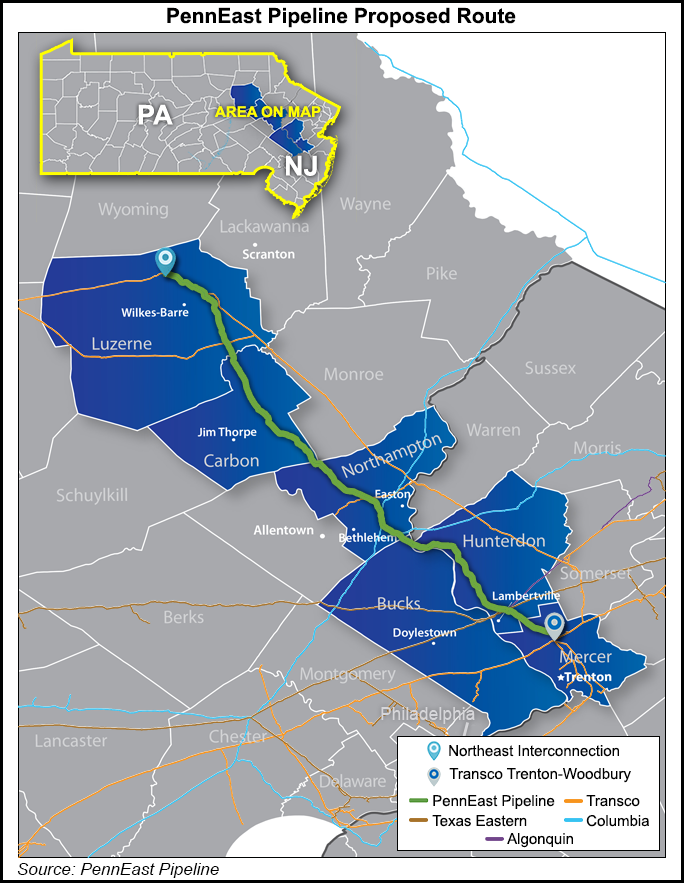Utica Shale | E&P | Marcellus | NGI All News Access | NGI The Weekly Gas Market Report
PennEast FERC Filing Responds to Environmental Objections
In a FERC filing last week, PennEast Pipeline Co. LLC issued a detailed response to a long list of comments made in opposition to its project.

The filing, discussing FERC’s authority to review and certificate interstate pipelines under the National Environmental Policy Act (NEPA) and the Natural Gas Act, addressed a number of the environmental objections that have been raised over PennEast and other proposed pipelines in the Northeast.
The 118-mile, 36-inch diameter PennEast Pipeline Project would run from Northeast Pennsylvania into New Jersey. The project had already subscribed about 90% of its 1.11 million Dth/d of capacity by September, around the time it filed with the Federal Energy Regulatory Commission (see Shale Daily, Sept. 25).
Besides reaffirming the project’s market demand and intended use, the filing also directly addressed two common environmental claims: that FERC should reject new pipeline projects because they will further encourage unconventional shale development and that FERC should review all proposed pipelines in the region programmatically to assess cumulative impacts.
“Commenters argue that the Commission must examine the extraction, transportation, and use of natural gas from across the entire Marcellus and Utica Shale region, implying that such activities are indirect effects of the PennEast Pipeline Project,” PennEast said, before going on to state that no legal basis exists for FERC to conduct such an analysis under NEPA
The company said “NEPA does not require an agency to consider the effects of every action that has some amorphous relationship, however attenuated, to a proposed federal action” and that “neither the upstream natural gas production activities in the Marcellus and Utica Shale region nor the downstream uses of such natural gas are caused by the PennEast Project.
“This regional development will occur regardless of whether the PennEast Project is built. The proposed project is responding to, and not causing, increased demands for natural gas.”
PennEast’s filing also detailed why FERC shouldn’t develop a programmatic environmental impact statement (EIS) to review all proposed pipelines in the region, as groups have urged the agency to do (see Shale Daily, Nov. 2).
“There simply is no affirmative federal policy for natural gas development in the region. Several commenters attempt to sidestep this reality by instead focusing on the existence of multiple natural gas projects currently proposed or anticipated in the region,” PennEast said, adding that “when the Commission takes action on an individual natural gas project, it does not do so in concert with its decisions on other, unrelated natural gas projects.”
PennEast disputed claims that the project is connected or related to other projects in the region and thus has been improperly segmented. The company drew distinctions between the PennEast Pipeline and the circumstances surrounding last year’s ruling on Tennessee Gas Pipeline’s Northeast Upgrade Project, in which the U.S. Court of Appeals for the District of Columbia Circuit determined that FERC had “impermissibly segmented in the environmental review” of the Northeast Upgrade Project. FERC responded to that ruling this week by determining that no additional mitigation was required to move forward with the project’s authorization (see Shale Daily, Nov. 20; June 6, 2014).
“Commenters have identified specific projects that they argue the Commission must consider in a single NEPA document…[but] because the PennEast Project has utility independent from these other natural gas projects, none of these other projects is a ”connected action’ with the PennEast Project, and the Commission does not improperly segment its review by considering the PennEast Project in its own EIS,” the company said.
FERC’s pipeline certification process has become a focal point for environmental protests as companies move forward with various interstate pipeline applications to build out transmission capacity for Northeast production (see Shale Daily, Nov. 2). Don Santa, president and CEO of the Interstate Natural Gas Association of America, said earlier this month that some protesters and environmental groups “seem to be using the FERC certificate process to wage a proxy war in opposition to natural gas, or to fossil fuels in general.”
And last month, Bill Yardley, president of U.S. transmission Spectra Energy Corp., a PennEast partner, made similar observations during a roundtable discussion in Washington, DC (see Daily GPI, Oct. 28). Remarking on protests of the company’s pipelines, Yardley said, “Everybody enjoys cheap energy on the demand side, so attacking [hydraulic fracturing and upstream production] is not a real winner. So they’re going to attack the delivery mechanism, and that’s who we are.”
© 2024 Natural Gas Intelligence. All rights reserved.
ISSN © 2577-9877 | ISSN © 1532-1266 | ISSN © 2158-8023 |
